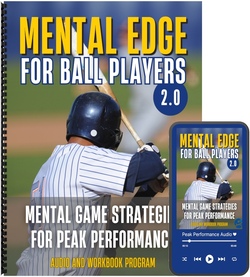How Do Baseball Players Build Lasting Confidence?
All baseball players experience ups and downs, but the key to lasting confidence isn’t about always playing well—it’s about knowing who you are as a player. When your confidence is tied only to results, it becomes fragile and inconsistent. Instead, true confidence is built from the inside out. By identifying your strengths, improving them through intentional training, and competing with them at the core of your game plan, you create a stable foundation you can trust in every game. Focusing on your strengths gives you something solid to lean on, especially when pressure builds or performance dips. Confidence isn’t something you chase—it’s something you train.
Rate your baseball confidence from 1-10.
Are you looking for practical strategies to boost your confidence a few points and maintain it throughout the ups and downs of the season?
The reason many players lack consistency during games is the lack of consistent confidence.
For example, when they are playing well, getting on base, driving in runs, or mastering their performance on the mound, they are confident.
However, as soon as their performance dips or they have a bad game, so does their confidence.
In these scenarios, confidence depends on performance results. The problem is that confidence is necessary for peak performance. When a player has performance-based confidence and is in a mini-slump, they feel powerless and rely on hope to have a productive game.
However, confidence isn’t as elusive as it seems.
Let’s look at the definition of “Sports Confidence”. Sports confidence is your level of belief in your ability to succeed in a specific situation. In other words, confidence is your trust in your skills and your ability to execute when needed.
Waiting to stumble upon confidence is not a solution. The key is to proactively fuel your confidence by focusing on your strengths. When you compete from your strengths, you increase self-belief and will feel a better sense of control over your play during games.
Logan Webb, pitcher for the San Francisco Giants, understands the concept of competing from your strengths. Webb’s fastball clocks in at 92-94 miles per hour. While respectable, by no means is Webb considered a power pitcher.
Webb knows that his strengths are mixing up his five pitches and throwing them consistently for strikes.
WEBB: “It’s just the way I try to pitch, try to keep it on the ground. We’ve got a really good infield, so [I] trust them… [I’m] always looking for a ground ball, especially with a guy on first.”
Webb’s confidence comes from knowing what he does well and pitching accordingly.
WEBB: “I wish I had a pitch that I could just throw by [hitters] – boom – but I’d rather try and do some other things. I feel good, just kind of mixing it up. I’m going to keep doing it.”
Building stable confidence in baseball isn’t about hoping you have a good game. It’s about knowing your strengths, game planning around them, and utilizing your strengths to the best of your abilities in games.
Trusting and competing from your strengths fuels steady, unshakable confidence. When you understand what you do well and rely on those aspects of your game, your confidence becomes less reliant on stats and more rooted in belief.
3 Methods to Build Confidence by Focusing on Your Strengths
Baseball is a game of failure, but confidence is what keeps you steady through the ups and downs. The key to building confidence in baseball is learning how to focus on what you do well.
Instead of trying to be perfect or fixing every flaw at once, lean into your strengths. When you know what you’re good at, train it with purpose, and bring it into competition, your confidence grows naturally.
Here are three simple, powerful ways to do that.
1. Know What You Do Well
The first step is identifying your strengths. Every player has something they do well—maybe it’s hitting for contact, being patient at the plate, throwing with command, or reading the field.
Take the time to think about the parts of your game that feel solid and consistent. Ask yourself, “What helps me succeed when I’m playing well?” You can also ask a coach or teammate for input.
Knowing your strengths gives you a foundation to stand on, especially when the game challenges you. It gives you something real to believe in when your confidence is shaky.
2. Focus on Improving Your Strengths
Once you know your strengths, your next move is to build them up. A lot of players focus only on fixing weaknesses—but what if you doubled down on what you already do well?
If you’re great at tracking pitches, keep sharpening that skill in the cage. If you’re a smart baserunner, keep improving your instincts. When you invest time in developing your strengths, you create consistency in your game.
That consistency leads to trust, and trust fuels confidence. It’s easier to believe in yourself when you’re putting work into the parts of your game that already give you success.
3. Compete From Your Strengths
The most important part is bringing your strengths into competition. Whether you’re stepping up to the plate or toeing the rubber, go in with a plan that plays to your strengths.
If you’re a contact hitter, focus on putting the ball in play. If your strength is pitch movement, stay focused on executing your best pitches. When you compete from your strengths, you’re not guessing—you’re playing with purpose. That makes it easier to stay calm, trust your approach, and recover from mistakes.
Confidence isn’t about being perfect—it’s about having something solid to lean on when the game speeds up.
Play With What You’ve Got
Building confidence in baseball starts by knowing what makes you a good player right now. You don’t have to be great at everything. You just need to know your strengths, work to grow them, and use them when it counts.
That’s how great players keep showing up with confidence—even after a slump or tough game.
So take a moment today to ask yourself: What do I do well? Then double down on it. Your confidence will thank you.
FAQs: Building Confidence in Baseball
Q1: Why does my confidence disappear when I’m not playing well?
A: You may be relying on performance-based confidence—feeling good only when results are good. True confidence comes from knowing and trusting your strengths, regardless of the scoreboard.
Q2: What’s the first step to building more consistent confidence?
A: Identify your strengths. Get clear on what you do well—this gives you a solid foundation to build your mindset and game plan around.
Q3: Should I focus more on strengths or weaknesses in training?
A: Both matter, but confidence grows fastest when you sharpen your strengths. Improving what already works for you gives you something to rely on in high-pressure moments.
Q4: How do I apply this during games?
A: Before each game, remind yourself of 2–3 specific strengths you’ll lean on. Whether it’s pitch mixing, plate discipline, or outfield range, use those to guide your decisions and mindset.
Q5: Can I use this even if I’m in a slump?
A: Yes! Focusing on your strengths is especially important during slumps. It keeps your mind from spiraling into doubt and helps you stay centered and proactive.
Related Sports Psychology Articles
- The Psychology of Baseball: Dealing with Pressure
- How Richardson Stays Confident in His Team
- Helping Ball Players Who Overthink Their Game
*Subscribe to The Sports Psychology Podcast on iTunes
*Subscribe to The Sports Psychology Podcast on Spotify
The Mental Edge for Ball Players (Digital Download)
“The Mental Edge for Ball Players” audio and workbook program teaches you to get a competitive edge in baseball and softball by overcoming a lack of focus, low self-confidence and other mental game obstacles. Learn practical mental strategies to improve your performance in competition.
“A quick note to let you know how effective your programs worked for my son who is 17 and plays varsity baseball in VA. In late 2009, I ordered the “Relaxed Athlete Program” for my son because I saw he was pressing too hard at the plate and had disappointing results for his season. Thanks to your programs, my son now has a completely new approach to the game of baseball (and school) and it’s more fun for him now. He made all-district player at his position and hit .443 this season. A complete 180 degree turn around from last year.”
~Mark M., Sports Parent



